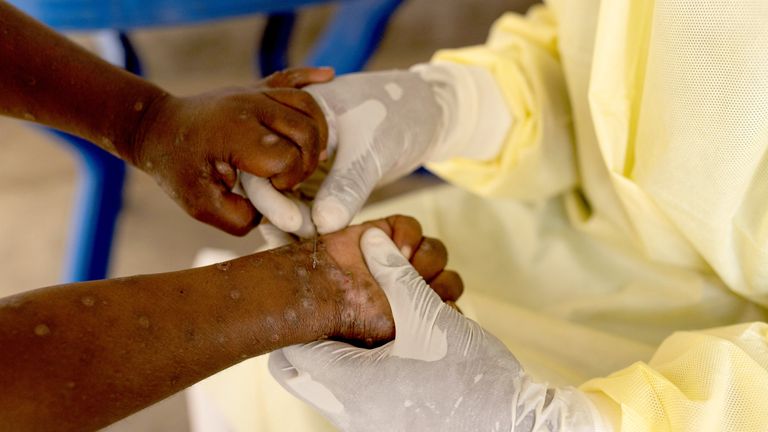A new, more infectious strain of mpox has been detected in the UK for the first time.
The single case of the mpox virus variant Clade 1b was detected in a patient who is being treated at the Royal Free Hospital in London, according to the UK Health Security Agency (UKHSA).
The UKHSA has said the risk to the population “remains extremely low” as it traces less than 10 direct contacts since the case was discovered.
Is the new strain worse?
The new variant that has emerged is known as Clade 1b, and is believed to cause milder symptoms than other strands of mpox, but it concerns health officials because it spreads more easily through close contact, particularly among children.
Clade 1b appears to be less severe than some other strains, with countries where it is circulating reporting around a tenfold reduction in case fatality rate, according to the UKHSA.
It was first detected in a mining town in the DRC earlier this year, before it spread to neighbouring countries.
What do we know about the UK case?
The case was confirmed to the UKHSA on Tuesday, which says the person involved had been on holiday in Africa and travelled back to the UK on an overnight flight on 21 October.
More than 24 hours later, they developed flu-like symptoms and on 24 October, started to develop a rash which got worse in the following days.
When they attended A&E in London on 27 October, they were swabbed, tested and then isolated while waiting for their results.
Fewer than 10 direct contacts are being traced after the discovery, and Professor Susan Hopkins, chief medical adviser at UKHSA, said the “risk to the UK population remains low”.
Has there been an outbreak in the UK before?
There have been cases of mpox in the UK before, with most seen in 2022 when there was a global outbreak of a less infectious strain which spread to more than 100 countries, prompting the WHO to declare a public health emergency of international concern on 23 July 2022.
A total of 2,137 cases had been confirmed in the UK at that stage, but by 31 December 2022 that number had soared to 3,732 cases – 3,553 were in England, 34 in Northern Ireland, 97 in Scotland and 48 in Wales.
Before the spring of 2022, UK cases were usually associated with travel to or from countries where mpox is endemic, particularly in western or central Africa.
But in May that year, there was a large outbreak in the UK, mostly in men who are gay, bisexual, or have sex with other men.
A vaccination programme was launched in the UK in the summer of 2022 and closed the following July.
There have been no reported deaths due to mpox in the UK.
Where else has the Clade 1b strain been found?
The total number of suspected cases in Africa since the beginning of the year now stands at 42,438, with 8,113 confirmed as mpox, according to the Africa Centres for Disease Control and Prevention.
At least 1,000 deaths have been reported across Africa, prompting the World Health Organization (WHO) to declare the increasing spread of the disease a global health emergency.
The first case of the variant outside of Africa was confirmed in Sweden in August, while one was also reported in Thailand and another in India earlier this month.
Germany also reported its first Clade 1b case on 22 October.
What are the symptoms?
Common symptoms of mpox are a skin rash or pus-filled lesions which can last two to four weeks.
The rashes can be located anywhere on the body and some people may only have one, while others can have hundreds or more.
These are other symptoms listed by the CDC:
- Fever
- Chills
- Swollen lymph nodes
- Exhaustion
- Muscle aches and backache
- Headache
- Respiratory symptoms (e.g., sore throat, nasal congestion, or cough)
The WHO says people may start to feel unwell before they get a rash or skin lesions, while for others the skin symptoms can be the first or only sign.
People with more severe mpox can suffer with the following symptoms, according to the WHO:
- More widespread lesions – especially in the mouth, eyes, and genitals
- Severe bacterial infections
- Lung infections
- Mpox affecting the brain (encephalitis)
- Heart (myocarditis)
- Lungs (pneumonia)
- Eye problems
Newborn babies, children, people who are pregnant and people with underlying immune deficiencies may be at higher risk of more serious mpox disease and death, the WHO adds.
How is it treated?
Currently, there is no treatment approved specifically for mpox infections, according to the CDC.
It says that for most patients with mpox who have intact immune systems and don’t have a skin disease, supportive care and pain control will help them recover without medical treatment.
People with severe mpox may require hospital treatment, supportive care and antiviral medicines to reduce the severity of lesions and shorten the time to recovery, the WHO says.
Many years of research on treatments for smallpox have led to the development of products that may also be useful for treating mpox, it adds.
It says an antiviral developed to treat smallpox called tecovirimat was approved by the European Medicines Agency for the treatment of mpox under exceptional circumstances in 2022. It also said its use for mpox has been limited so far.
However, a two-dose vaccine has been developed to protect against the virus, which is widely available in Western countries but not in Africa.
Scientists from the Africa Centres for Disease Control and Prevention (Africa CDC) say they need more than 10 million vaccine doses but only 200,000 are available.
What is mpox?
It is a viral disease that has occurred mostly in central and western Africa.
Mpox has been endemic in parts of Africa for decades after it was first detected in humans in Democratic Republic of the Congo (DRC) in 1970, having originally been identified in laboratory monkeys, according to the US Centers for Disease Control and Prevention (CDC).
It used to be known as monkeypox, but was renamed in 2022 by the WHO after receiving complaints that the original name was “racist and stigmatising”.



























